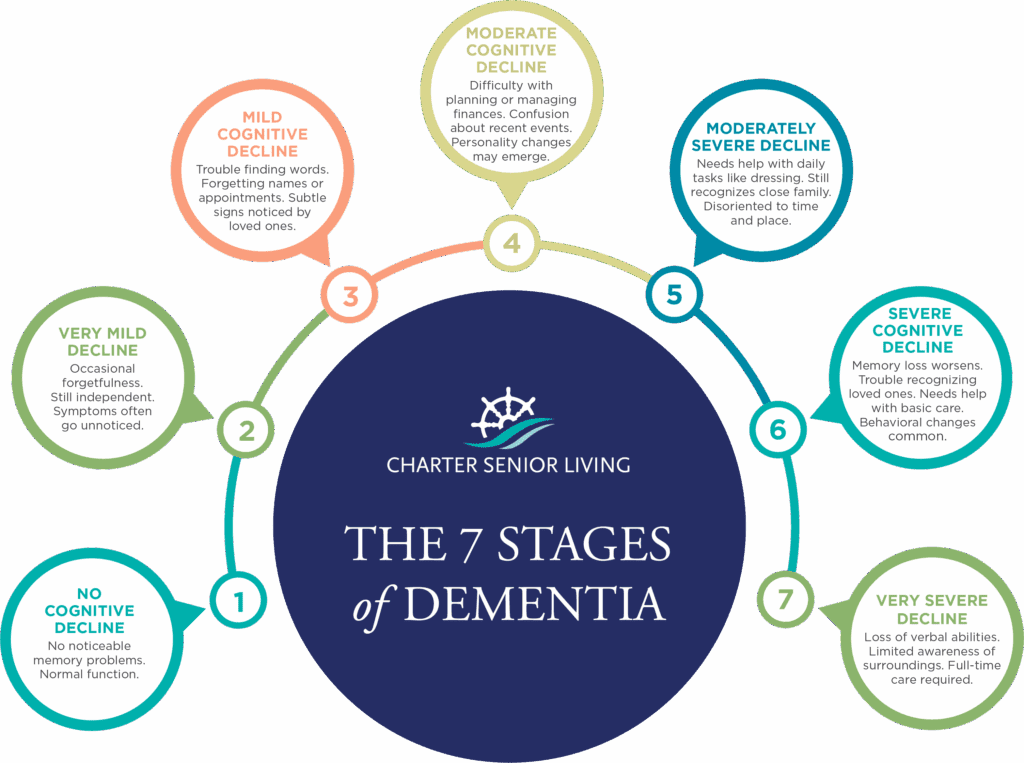Caring for an aging parent with dementia is a journey filled with emotional and physical challenges. Family members often face overwhelming decisions, changes and uncertainty as they work to provide the best care possible.
It’s important to know that you are not alone. Understanding dementia, learning effective strategies, and accessing the right resources can help ease the journey — for both you and your loved one.
In this guide, we’ll offer compassionate insights and practical strategies to help families support a parent with dementia while preserving quality of life and maintaining caregiver well-being.

Understanding Dementia and Its Stages
Dementia is a progressive decline in cognitive function that interferes with daily life. While Alzheimer’s disease is the most prevalent form of dementia, it is not the only type. There are many other common varieties, including vascular dementia, Lewy body dementia, and frontotemporal dementia.
These conditions impact memory, communication, judgment and behavior—often making it difficult for a person with dementia to manage daily tasks, communicate effectively, and recognize loved ones, especially as the disease advances in older adults.
In the early stages, you may notice:
- Increased forgetfulness
- Difficulty finding words
- Confusion about time or place
- Subtle personality changes
As the disease progresses, individuals may:
- Struggle with daily routines
- Forget familiar people or places
- Become easily agitated or withdrawn
- Exhibit wandering or repetitive behaviors
Understanding the stages of dementia—from mild to severe—can help caregivers:
- Adjust care approaches over time
- Provide person-centred dementia care that supports safety and dignity
- Prepare for long-term care needs
- Seek support groups and helpful resources
Educating yourself about dementia not only builds empathy but also equips you to navigate the journey ahead with confidence and compassion.

Practical Tips for Day-to-Day Care
Daily caregiving can feel overwhelming without structure and planning. Here are some practical tips for day-to-day care:
- Create a consistent routine to provide stability and comfort.
- Simplify tasks by breaking them into small, manageable steps.
- Use memory aids, such as calendars, labels, and reminders for medication.
- Keep the environment calm and predictable to reduce stress and confusion.
- Offer choices when possible, such as letting your parent choose between two outfits.
- Be patient and flexible, adjusting your expectations as needed to support their evolving abilities.
By focusing on managing dementia-related behaviors and promoting a calm atmosphere, you can help maintain your parent’s quality of life.
Effective Communication Strategies
As dementia affects communication, adapting how you interact is key. Here are a few effective communication strategies:
- Speak slowly and clearly, using simple words and short sentences.
- Maintain eye contact to show attentiveness and encourage engagement.
- Ask one question at a time and be patient in waiting for a response. Try using yes or no questions rather than open-ended questions.
- Provide ample time for your loved one to process the conversation and offer reassurance.
- Use body language, such as gentle touch or a reassuring smile, to convey support.
- Offer emotional validation—acknowledge their feelings even if their words are confused.
- As dementia progresses, non-verbal communication, such as tone of voice, gestures, and facial expressions, often becomes the most powerful way to connect.
Remember, the goal is to reduce frustration and make your parent feel understood and valued.
Managing Dementia-Related Behaviors
Challenging behaviors are often a part of the dementia journey. Managing dementia-related behaviors compassionately can make a significant difference.
Common behaviors include agitation, wandering, and repetitive questioning. To address these:
- Redirect attention by engaging your parent in a favorite activity or conversation.
- Use calming techniques like playing soothing music or offering a comforting object.
- Don’t argue if your parent is confused; instead, gently reassure and redirect.
- Monitor mental health closely, as depression and anxiety are common and may require additional support.
With patience and understanding, you can help manage behaviors while safeguarding your parent’s dignity and emotional well-being.
Emotional Support for Caregivers
Caring for a parent with dementia can take a toll on your own mental health. It’s crucial for caregivers to seek emotional support:
- Join support groups where you can connect with others facing similar challenges.
- Prioritize self-care by exercising, practicing mindfulness, and setting aside personal time.
- Ask for help from other family members, friends, or professional caregivers.
- Consider counseling if you’re feeling overwhelmed, anxious or isolated.
You can provide the best care for your parent by making sure to care for yourself, too.
Planning for the Future
Because dementia progresses over time, planning for the future is essential:
- Establish legal and financial documents early, such as powers of attorney and living wills.
- Explore Memory Care options to find specialized settings that support the unique needs of people with dementia.
- Consider long-term care insurance or other resources that can help cover future care expenses.
- Visit Memory Care communities like Charter Senior Living of Oak Openings, where compassionate, personalized care is designed to meet the needs of residents at every stage of Alzheimer’s or other forms of dementia.
Early planning helps alleviate stress down the road and ensures your parent receives the right level of care when they need it. Learn more about thoughtful & helpful gifts for seniors with dementia.

Discover Compassionate Care at Charter Senior Living of Oak Openings
The journey of supporting a parent with dementia is filled with challenges, but it also brings meaningful moments of connection. By understanding dementia, using effective communication strategies, and implementing practical care tips, you can help your parent maintain their quality of life while also caring for your own well-being.
At Charter Senior Living of Oak Openings, we understand the complexities of dementia care and are here to offer compassionate, personalized support. Our Memory Care and Assisted Living services in Ohio provide a nurturing environment where your loved one can thrive at every stage of dementia. Whether you’re planning for the future or in need of emergency placement, our team is here to guide you every step of the way.
Contact us today to learn more about our care options in Ohio—our team is ready to assist you in finding the right path for your family. Schedule a tour and discover how our supportive community can make a difference for you and your loved one.




